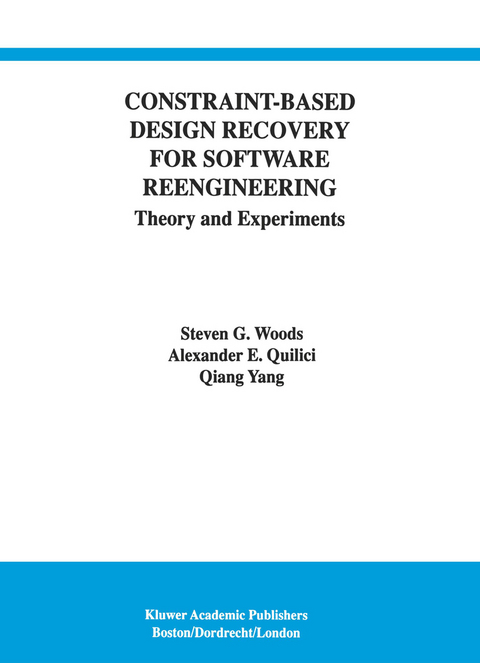
Constraint-Based Design Recovery for Software Reengineering
Springer (Verlag)
978-0-7923-8067-2 (ISBN)
1. Introduction.- 1.1 Program Understanding.- 1.2 The State of The Practice.- 1.3 Conceptual Program Understanding.- 1.4 The Remainder of This Book.- 2. Plan-Based Program Understanding.- 2.1 Overview.- 2.2 Ast-Based Approaches.- 2.3 Graph-Based Approaches.- 2.4 Analysis of Previous Approaches.- 3. Program Understanding and Constraint Satisfaction.- 3.1 Introduction.- 3.2 Constraint Satisfaction Problems.- 3.3 Program Understanding as Constraint-Satisfaction.- 3.4 Modeling Existing Program Understanding Algorithms.- 4. Initial Experiments with Concept Recovery.- 4.1 Introduction.- 4.2 Experimental Framework.- 4.3 Experiments With Csp Solvers.- 4.4 Comparing Existing Approaches.- 4.5 Summary of Results.- 5. Additional Experiments with Concept Recovery.- 5.1 Introduction.- 5.2 Experimental Framework.- 5.3 Some Experiments With “Real” Programs.- 5.4 Experiments with Domain-Value Pre-Filtering.- 5.5 Experiments With A New Constraint-Based Algorithm.- 5.6 Summary.- 6. Program Understanding and AI Plan Recognition.- 6.1 Introduction.- 6.2 An Ai Approach to Plan Recognition.- 6.3 Problems with Applying AI Plan Recognition.- 6.4 Layered Map-CSP Versus the AI Approach.- 7. Improving our Constraint-Based Approach.- 7.1 Introduction.- 7.2 Addressing Problems with Layered Map-Csp.- 7.3 Integrated Understanding: PU-CSP.- 7.4 Solving Strategies for PU-CSP.- 7.5 PU-CSP Versus Layered MAP-CSP.- 8. Conclusions.- 8.1 Summary.- 8.2 Future Experiments.- 8.3 Future Modeling and Algorithm Development.- 8.4 Future Tool Development.- 8.5 Applying Plan Recognition to the Year 2000 Problem.- 8.6 Contributions to Artificial Intelligence.- 8.7 Final Remarks.- References.
| Reihe/Serie | International Series in Software Engineering ; 3 |
|---|---|
| Zusatzinfo | XXII, 189 p. |
| Verlagsort | Dordrecht |
| Sprache | englisch |
| Maße | 155 x 235 mm |
| Themenwelt | Mathematik / Informatik ► Informatik ► Betriebssysteme / Server |
| Mathematik / Informatik ► Informatik ► Software Entwicklung | |
| Informatik ► Theorie / Studium ► Künstliche Intelligenz / Robotik | |
| ISBN-10 | 0-7923-8067-3 / 0792380673 |
| ISBN-13 | 978-0-7923-8067-2 / 9780792380672 |
| Zustand | Neuware |
| Haben Sie eine Frage zum Produkt? |
aus dem Bereich


